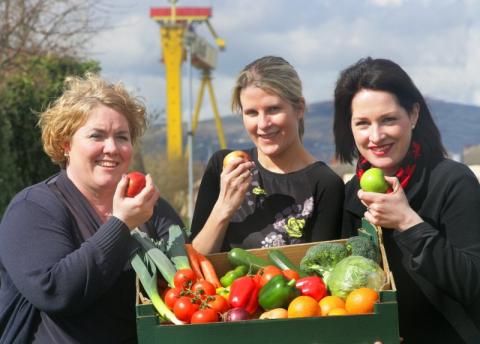Vulnerable groups getting FareShare of food

A project that distributes surplus food to charities and voluntary organisations is having a positive impact on the health and wellbeing of disadvantaged groups.
Council for the Homeless NI (CHNI) FareShare is directly tackling food poverty in Northern Ireland by collecting surplus food from industry and redistributing it to charities that are providing meals to vulnerable and disadvantaged groups, including low income families, senior citizens, people with a disability, victims of domestic violence, at-risk young people and homeless people.
Now a report, funded by the Public Health Agency (PHA) and the Food Standards Agency in Northern Ireland (FSA in NI), and carried out by Gauge NI, has shown that people who have benefitted from the FareShare project in Northern Ireland have overall increased levels of energy, improved mental health and greater social interaction.
Participants in the scheme also generally said they felt healthier, had a greater sense of belonging in the community and did not have to skip meals.
Meabh Austin from FareShare NI said: “We see benefits not only for those service users eating the food but also for the volunteers who cook the meals and arrange events for the groups. Over the past four years, the FareShare project has been a huge success in assisting vulnerable people and charities, helping them make savings on food bills and allowing them to divert funds to other areas of service provision.”
The initiative benefits from fresh and non-perishable food from over 40 local food producers as well as three of Northern Ireland’s main supermarkets – ASDA, Sainsbury’s and Tesco – and contributes to making over 350,000 meals each year.
The food is given to FareShare before it even hits the shelves. It can be food that is over-stocked, seasonal or delisted, has damaged outer packaging, production trial products, or has printed labelling errors. It travels from the retailers’ distribution centres to the FareShare depots and then on to around 70 organisations.
Colette Rogers, Health Improvement Manager at the PHA, said: “Improving health and wellbeing and reducing health inequalities is central to the work of the Public Health Agency. Supporting the excellent work of FareShare has benefitted low income families, senior citizens and at-risk young people, among many others. As well as benefitting from nutritious meals, the get-togethers are creating improved social interaction among groups who can often feel isolated.”
Food through FareShare is provided to community and voluntary organisations, not to individuals. These organisations are selected through an application process. They then use the food to prepare meals on site for the groups that use their facilities.
Maria Jennings, Director of FSA in NI, said: “We are pleased to have co-funded this report which shows how essential FareShare’s work is to vulnerable groups within the community and what a positive impact it is making on people’s lives.”
One group who benefits from FareShare is the Newington Day Centre’s senior citizen’s group.
Margaret McCrudden, the centre’s manager, said: “Thanks to FareShare, the members of Newington Day Centre enjoy a healthy afternoon tea with lots of fresh fruit, yogurts, brown bread and often a selection of different cheese. Often older people living alone miss out on their five a day as they cannot carry fruit or they see these things as a luxury. As a charity we could not provide the range of snacks we have without the dedicated staff and volunteers at FareShare and the generosity of our local stores.”
- Around 400,000 people live in relative income poverty in Northern Ireland. Around 100,000 of these are children.
- The greatest impacts reported by the service users as a result of the work of FareShare were:
- 56% of service users reported increased levels of energy, confidence and optimism
- 53% of service users reported feeling physically healthier
- 97 children availing of hot meals daily which include dairy, fruit and vegetables
- 69% of service users can now access a meal every second day
- 54% of service users have not missed a meal in the last two weeks due to lack of money
- 74% reported having better mental health
- 23% reported increased use of communication skills causing increased sense of belonging and social interaction.
- Food for FareShare is transported in refrigerated vehicles. The products can be unused by retailers for a variety of reasons:
- overstock
- post-promotional date on packaging
- depot & retailer rejections
- seasonal and delisted lines
- outer packaging damages
- production trials/new product development samples
- minimum production runs
- QA rejections, e.g. quality/weight /visual
- surplus raw materials on current/deleted lines
- manufacturing errors
- incorrect forecasts.
- The FareShare depot is Environmental Health registered, and can handle chilled or frozen products with full temperature control, food safety and traceability assurance.
- Any community organisation or food producer willing to get involved in the scheme can contact Declan McKillop at the Belfast Depot on (028) 9033 2230 ordeclan.mckillop@fareshare-ioi.eu
- FareShare is supported by the Public Health Agency, Food Standards Agency in NI, the Henry Smith Foundation, WRAP (Waste and Resource Action Programme) and Rethink Waste.
